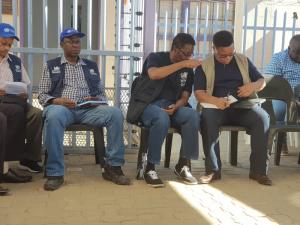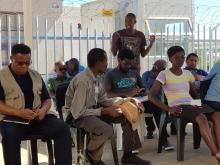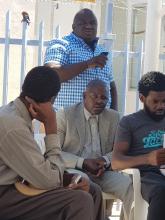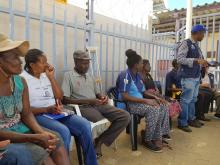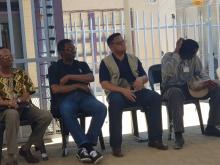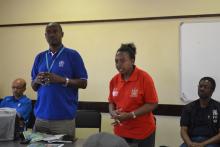Community engagement to find solutions to the ongoing Hepatitis E Virus outbreak in Windhoek informal settlements
An outbreak of Hepatitis E (HEV) in Windhoek was declared by the Ministry of Health and Social Services on 14 December 2017. As of 5 January 2018, the Ministry recorded cumulative 214 cases. Over 39% of the cases are from the Havana informal settlement and 19% from Goreagab Dam area. Two meetings were held with community leaders from the affected communities on 31 December 2017 and on 6 January 2018. The meetings were facilitated by Ministry of Health and Social Services (MoHSS) and WHO to discuss the outbreak in the community and agree on key action points to halt the active transmission of the disease. The MoHSS Interim Permanent Secretary, Dr Dave Uirab gave an overview of Hepatitis E and the extent of the outbreak. WHO Country Representative, Dr Charles Sagoe-Moses emphasized on the important role community leaders play in creating awareness among the population on how to prevent the spread of the disease in the community. WHO Technical Officer for Risk Assessment, Dr Allan Mpairwe, facilitated a dialogue with the community leaders on their knowledge about HEV, their understanding on causes of the disease and possible solutions.
Community leaders identified risk factors that may facilitate transmission in the community which included open defecation, limited knowledge of the disease and lack of handwashing facilities. The community also expressed concern over the personal hygiene of street food vendors. Community vegetable gardens were also said to be a potential source of contamination since most of these gardens use potentially contaminated water. Although the community has piped water points, they are not sufficient and some households are far from these water points. Most would fetch water and store in containers providing an opportunity for the water to be contaminated during usage. Some of the community members may use other sources of water including water from the river banks as well as harvesting rain water
The leaders further expressed concern over the limited sanitation facilities in the community. “They refer to us as illegal but the government is benefiting from us through our taxes. Even if we are illegal, we are Namibians and the government needs to provide these services in our community. ” said one of the leaders in reference to limited sanitation facilities. In addition, some households especially the once close to the communal toilet facilities would lock the facilities due to poor hygiene practices, exacerbating the limited access to sanitation facilities.
Although the situation is dire, the community leaders committed to educating their constituents on prevention and hygiene. They also proposed for a community cleaning campaign and requested the deployment of more health extension workers to strengthen community awareness. Some community members recommended the building of temporary sanitation facilities to which the City of Windhoek invited a delegation of at least 3 leaders to their offices for further consultation. A flyer was given to the leaders to support their health education efforts in the community. Two youth leaders requested for an electronic copy of the flyer to distribute through social media platforms. Dr Dave Uirab and his team assured the community of their ongoing efforts to curb the further spread of the disease. Dr Charles Sagoe-Moses encouraged the community leaders to translate their commitments into concrete community led initiatives to control the Hepatitis E Virus outbreak. Similar meetings will be hosted in different sections of the affected settlements with support from the Constituency Councilors and Town Council. The community engagement is part of a comprehensive multi-sectoral response to the outbreak.
